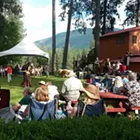As a Spokane Valley firefighter and EMT, Darrin Coldiron saves lives for a living. Even so, he never could have imagined that he'd help save a village on the other side of the world. Yet when the tsunami struck South Asia on Dec. 26 -- killing about 300,000 people, displacing more than 500,000 others and devastating infrastructure along the coasts of India, Indonesia, Thailand and Sri Lanka -- Coldiron sprung to action. He immediately called his old college rugby teammate from the University of Montana, who is from Sri Lanka.
"He survived," Coldiron says, still sounding relieved almost four months after the disaster. But his friend's country was devastated; more than 30,000 Sri Lankans were killed. Instead of writing a check, Coldiron decided to lend a hand.
In a matter of days, he convinced fellow firefighter Nick Muzik to go to Sri Lanka with him for part of the time; his colleagues at the fire department vowed to cover Coldiron's shifts so he wouldn't lose his job during his months abroad.
Coldiron and Muzik toured the most devastated regions of the country and quickly focused on the village of Komari, near the easternmost point of Sri Lanka. Although Komari was among the most devastated areas, it hadn't yet received as much aid as other coastal places (for a variety of political reasons). It was in this ravaged seaside town of 2,500 that he set up recovery operations.
"I've learned that a lot of aid work is ignorant aid," Coldiron says, referring to the vast amounts of food and toiletries that organizations have shipped into the tsunami-ravaged regions, only to have it rot or go unused because it wasn't something local people needed. "The way to do [aid] is to help people become self-sustaining."
After three months in Komari, Coldiron has helped establish the NFDR-Komari Recovery Project, which includes working with the locals to rebuild the school and houses, to decontaminate wells and to establish a health care program, a horticulture system, art and education programs, livestock and veterinary systems and an early-warning Tsunami Force Reduction system.
K. David, is the Komari school principal and a respected town leader. He says the NFDR programs are by far the most profound help his village has had. "We are neglected by the [Sri Lankan] government," he says, explaining that because Komari is in the Tamil region, and Tamils are a minority in Sri Lanka, they receive far less aid and are isolated from the media. "There is a lot of talking, but we don't see action. The people [in Komari] are still in tents."
David was the first person in the village to have his home rebuilt along the coast. He says most of the other villagers are hesitant to move back to the beach for fear of another tsunami. In the meantime, they exist in cramped and unsanitary refugee camps originally set up by aid agencies that don't have a realistic understanding of local needs and abilities. The camps, Coldiron and David agree, have created a plethora of other problems in addition to the destruction caused by the tsunami.
"I have to say I've been a little dismayed with how the Western relief organizations have handled it," Coldiron says, describing small, heat-laden tents housing seven families apiece. "[The aid agencies] have created slums. It's like a concentration camp."
Now Coldiron is back in the Inland Northwest and has brought David to help put on a program at the Met that will raise money for the NFDR-Komari Recovery Project. Met owner Mitch Silver is donating the venue, the bands are playing for free and a variety of other businesses (including Coeur d'Alene Printing and Mountain Gear) have donated services and equipment for the Recovery Project.
"I've learned a lot about how people react to catastrophes," Coldiron says. "You can never really know. I've been amazed at how well the Tamil people have dealt with this." If all goes well at the fundraiser, perhaps the Tamils will be amazed at how well Inland Northwesterners have dealt with it as well.
The Komari Recovery Concert and Fundraiser featuring Crosstown, Ozmo Boogie, Laffin Bones and Aaron Richner is Wednesday, April 20, at 7 pm at the Met. Tickets: $10 (those who make a donation of $25 or more will receive artwork made by Komari children). To learn more about the NFDR-Komari Recovery Project or to donate, visit www.nfdr-komari.com, or e-mail darrincold@msn.com.
Publication date: 04/14/05















